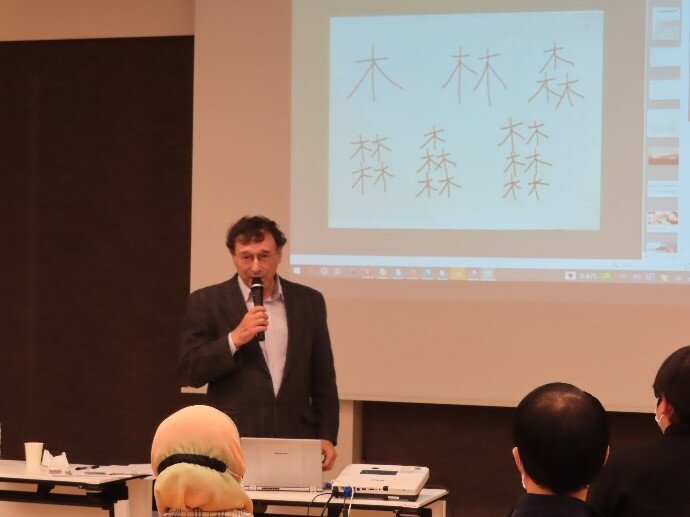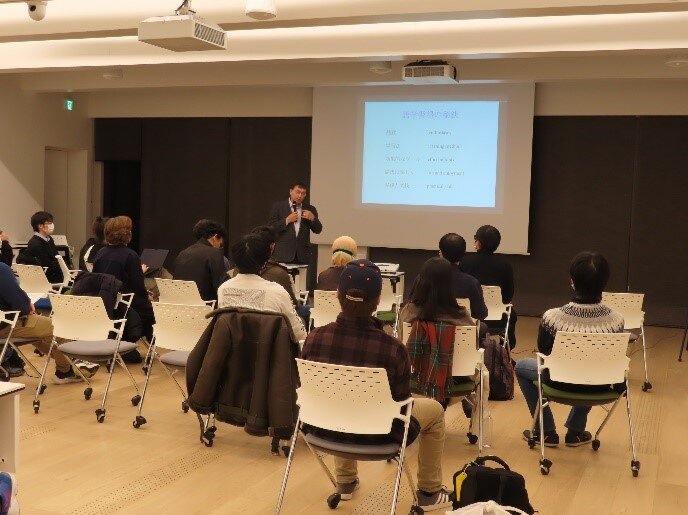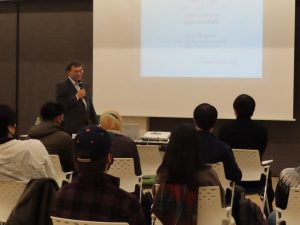On December 2nd 2022, Mr Jack Halpern discussed his 40-year-long experience as a multilingual translator in Japan. Mr Jack Halpern is a lexicographer, an entrepreneur and a polyglot who speaks 18 languages. He founded the CJK Dictionary Institute, a company that publishes Chinese, Japanese, Korean and Arabic dictionaries.
Mr Halpern was first introduced to the world of Kanji by a Japanese friend he met in Israel. The friend showed how the simple kanji of tree (木) can be combined to form the more complex kanji of wood (林) and forest (森). This sparked a fascination in Mr Halpern for languages and complex kanji. This very fascination fuelled his career and eventually led Mr Halpern to move to Japan.


In Japan, Mr Halpern tried to acquire the language through several language-learning books including the ones adopted in elementary school. However, not a single book was satisfactory to him, as they were all based on rote memorization. Mr Halpern found that a kid can learn a language through memorization alone, but an adult needs an additional incentive or he will get bored and give up on learning entirely. Instead, Mr Halpern was able to learn the language by reading bilingual texts, books or newspapers that showed the corresponding English translation next to the original Japanese source. By learning the language in this way, Mr Halpern was able to discover that some kanji have a core meaning and by combining these kanji with a core meaning a person can guess the meaning of more complex kanjis.
Thanks to this discovery, Mr Halpern invented a new indexing scheme for classifying Kanji called SKIP.
He also wrote the first Japanese dictionary that focused on teaching the “sense” or “core meaning” of every kanji and how they correlate with each other to convey more complex information. With this first dictionary, Mr Halpern was able to start his company and now he is working on releasing language translator dictionaries between Japanese and 12 non-English languages.
As a polyglot, Mr Halpern’s experience can provide insight on how to best learn a language. According to Mr Halpern, the easiest way to learn a language is to find a hobby or a new interest that requires learning a new language. This external motivation will make learning the language easier. For example, Mr Halpern currently is learning Vietnamese as he travelled to the country and was enamoured with the local culture.
Mr Halpern’s learning method focuses on bilingual texts. If no bilingual texts are available, he will purchase the same book in two different languages and prepare the bilingual version by himself. His suggestion is to choose books that are interesting and fun to read. He also stressed that it does not matter if you forget a word, the most important thing in language learning is to be exposed to words and concepts in their natural context.
The Q&A session focused on the language learning aspect of Mr Halpern’s career. Mr Halpern believes that the key to learning a language is choosing a learning method that is effective for you and using the most efficient tools while still having fun. He recommends YouTube, as it is quite entertaining and can expose you to many new words in the right context. He also recommends apps like Babbel and Busuu that show words in their natural context, unlike Duolingo which focuses on memorization. Language classes and grammar study are certainly important, but they shouldn’t be the number one focus. It is normal to make mistakes when learning a language, the important part is to keep the enthusiasm and work on learning every day.

In my opinion, this talk was illuminating. I found Mr Halpern’s passion for language inspiring and although I don’t think everyone can become a polyglot like him, I believe that everyone can benefit from his language-learning wisdom. After attending this talk, I will definitively search for a new hobby that will push me harder in my Japanese learning journey.
Reported by:
Marcello Gecchele
Department of Computer Science
School of Computing

